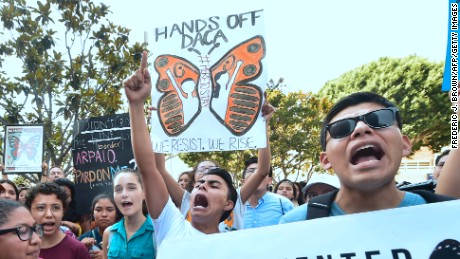The Impact of DACA’s Removal on West

Sep 11, 2017
President Donald Trump recently announced that he plans to end the Deferred Action for Childhood Arrivals (DACA) program, a form of administrative relief from deportation. The purpose of DACA is to protect eligible immigrant youth from deportation if they came to the United States when they were children. DACA gives young undocumented immigrants temporary protection from deportation and allows them to obtain a work permit.
Trump’s policy change could possibly be putting the lives of 800,000 young adults at the risk of deportation. As of Tuesday, the Department of Homeland Security will stop processing any new applications for the program. Currently, the policy, established in 2012 under the Obama Administration, allows certain illegal immigrants who entered the country as minors to receive a renewable two-year period of deferred action from deportation and eligibility for a work permit.
While the termination of the program would not be immediate, Congress has been given six months to decide the fate of DACA. If Congress cannot raise enough capital to make a decision on the matter, by as early as March 2018, those protected under the policy will be at high risk for deportation.
Niles West Superintendent Steven Isoye understands the weight of this issue, and he sent out a message to District 219 students, faculty, and parents, addressing concerns that may arise as a result of the policy.
“We are well aware of the fact that some of our students have relied on this program to help them feel safe in our schools and in our community,” Isoye said. “We are very concerned that any changes in the program, or an elimination of the program, could negatively impact the plans and the lives of these students and their families”
The message went on to ensure that the safety, security, and privacy of students are the district’s foremost priority. The Student Services office at each school can provide resources for families affected by this change.
Assistant Principal of Student Services Antwan Babakhani explained the limitations of what West can do for these students.
“I think it’s a difficult situation. With DACA, these students trusted the process and were let down. This thing was supposed to be their saving grace to not worry about being undocumented, and they are being pushed to the side. This puts a lot of public schools at a disadvantage, especially in the Chicagoland area, specifically because it makes it really hard for what our next steps are. All we can kind of do is wait and see what Congress decides on.”
One student, who chose to remain anonymous, gave insight on what is lost due to the removal of DACA.
“[Trump’s removal of DACA] makes it very difficult for me because out of all of my siblings, I am the only one who wasn’t born here; I was born in Mexico but I was raised here [in the U.S.] for most of my life,” they said. “My parents came to the U.S. for a better life and now that DACA is being thrown away it’s just not fair. DACA provides many immigrants with a social security number and even helps them get into college. It’s just very hard because I was going to apply for DACA since I am here illegally, but now it’s too late.”
Junior Anna Donada is a legal immigrant herself, but she has some family members that are not. She shared her thoughts on why DACA is beneficial to all undocumented immigrants.
“It’s unfair to make young immigrants worried about whether they are getting deported or not. If the U.S. stands by giving everyone an equal opportunity then it should support these immigrants by giving them the opportunity to stay in the U.S. since it is what they consider [to be] home,” Donada said. “The removal of DACA can take away their homes and everything they know.”



